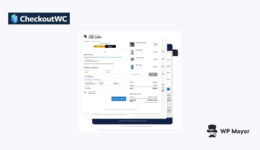Keep Your Comms Private: Your Best Secure Email Options in 2025

Secure email sounds like a no-brainer. Who wants insecure email? Particularly when your inbox contains billion-dollar business secrets (you hope).
So, which provider should you use?
That’s where the water gets a little murky. Every platform claims to be the most private and secure. But they can’t all be.
Luckily, our web hosting expertise gives us some unique insights. We can tell which providers are making promises they can’t keep — and which ones will genuinely make your comms more secure.
Buckle up, truth bombs are heading your way!
The Best Secure Email Providers Compared
As hosting specialists, we manage our own email servers. We know what it takes to provide a solid service. And that gives us a unique viewpoint for assessing other platforms.
To size up the players, we’ve created a framework that draws on our hosting knowledge:
- Security: Are these providers truly secure? We’re looking for strong end-to-end encryption and cybersecurity hardening.
- Privacy: Just because your data is protected doesn’t mean it’s private. We want to see reasonable privacy policies and hosting based in privacy-conscious locations, such as Switzerland.
- Reliability: We’ve seen many low-end providers come and go. With a trained eye, you can predict which ones are likely to falter.
- Features: Given that we provide our own email hosting service, we know which features you’re going to need on your business email account.
- Pricing: What is a fair price to pay for secure email? We have a good idea how much it costs to run a hosting business!
With all that in mind, shall we get started?
1. ProtonMail: Gmail’s Secure Cousin
You probably know someone who uses ProtonMail. It’s one of the most popular secure email platforms, with over 100 million users.
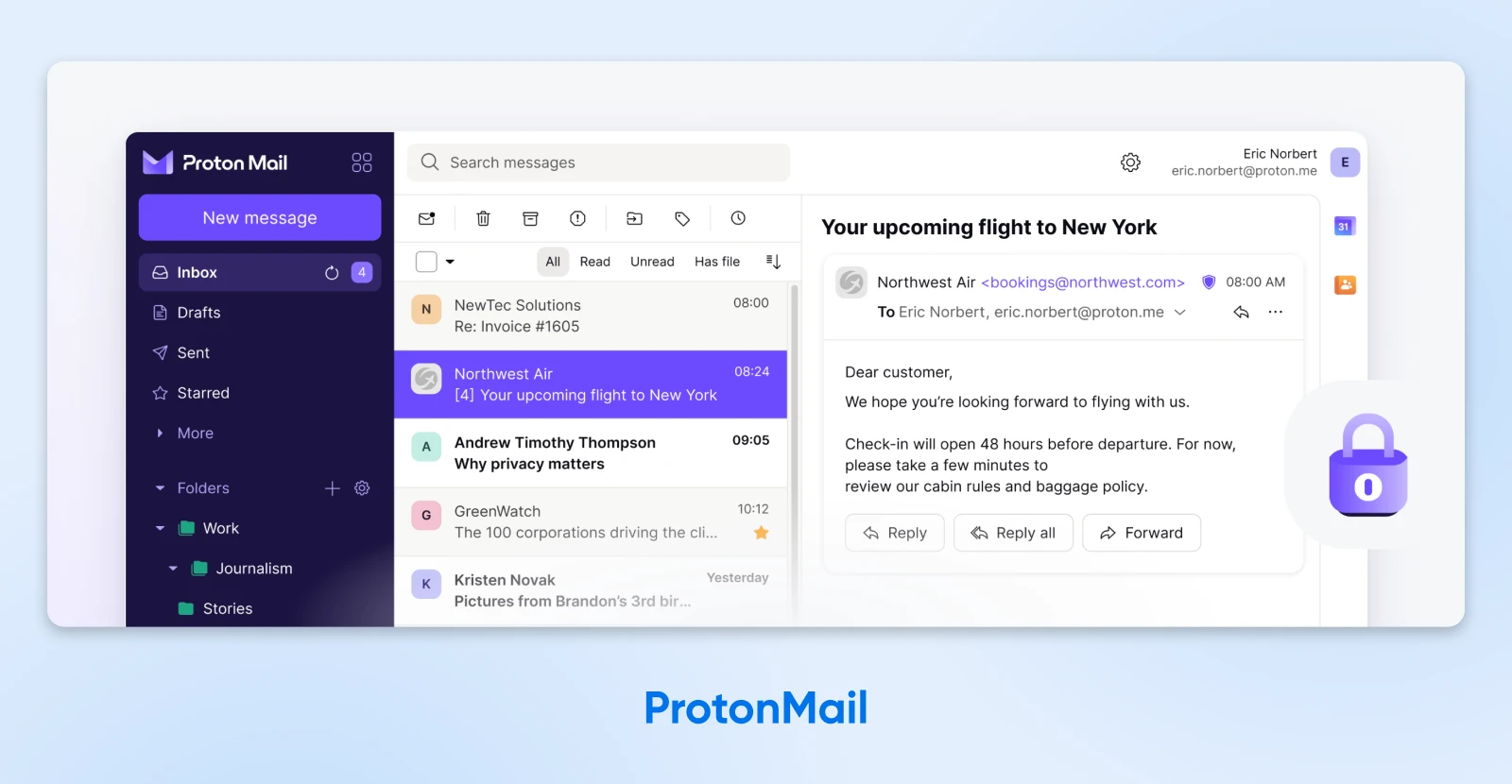
There are two main reasons why ProtonMail has spread so quickly: it’s lovely to use, and you can start for free.
It’s also part of a wider productivity suite that offers a privacy-focused alternative to Google Workspace. This makes it particularly appealing if you currently rely on Google or Microsoft.
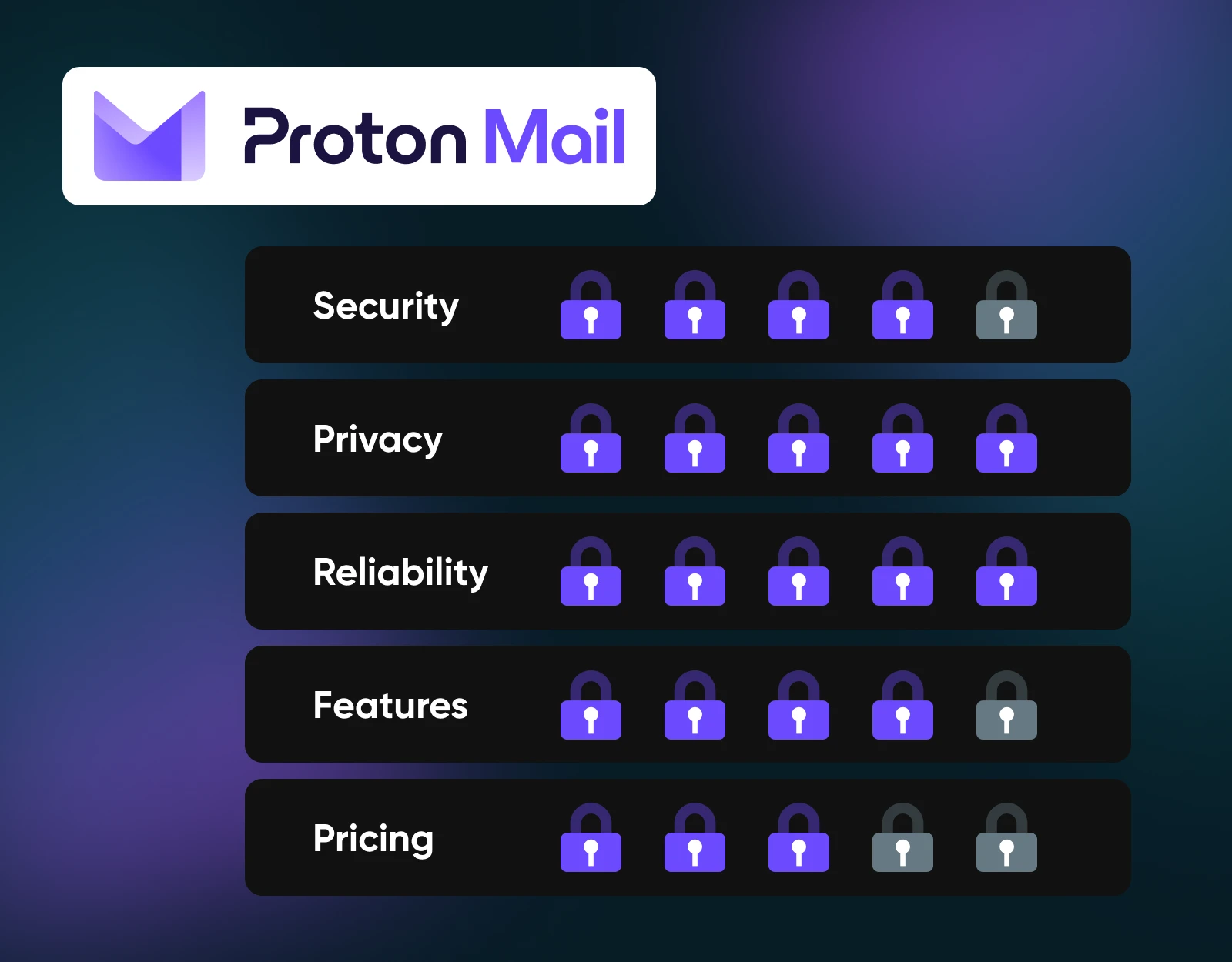
- Security: Good. ProtonMail uses end-to-end encryption to secure your messages. The platform also offers robust anti-spam, anti-phishing, and DDoS protection.
- Privacy: Excellent. Based in Switzerland, ProtonMail operates a “zero access” policy, meaning even they can’t see your emails. The company doesn’t keep activity logs and has a successful track record fighting government data requests.
- Reliability: Excellent. ProtonMail owns its own secure data centers in Switzerland, providing 99.95% uptime on business plans. The service is also 11 years old and looking stronger than ever.
- Features: Good. As long as you’re on the paid business plans, you can expect a Google Workspace-like experience, including custom domains. You will need to install “bridge” software to make Proton work with your favorite desktop email client, though.
- Pricing: Fair. ProtonMail is free to try, but you’ll probably want to upgrade. Starting at €6.99/month (~$8.17), paid plans aren’t unreasonable, but they are a little above average.
The expert verdict: ProtonMail is the gold standard for user-friendly, high-security email. The only downside is that most business features come with premium pricing.
2. Tuta Mail: The Budget-Friendly, Open Source Fortress
Tuta Mail is probably ProtonMail’s closest direct rival. It already has 10 million users, and the platform is growing quickly.

Tuta’s pitch has obvious appeal: bank-level security for the price of a coffee. You can see why it’s popular with bootstrapped startups and solo entrepreneurs.
That said, the low price does come with a trade-off — you won’t get the same features with Tuta as some other, more premium apps in this list.
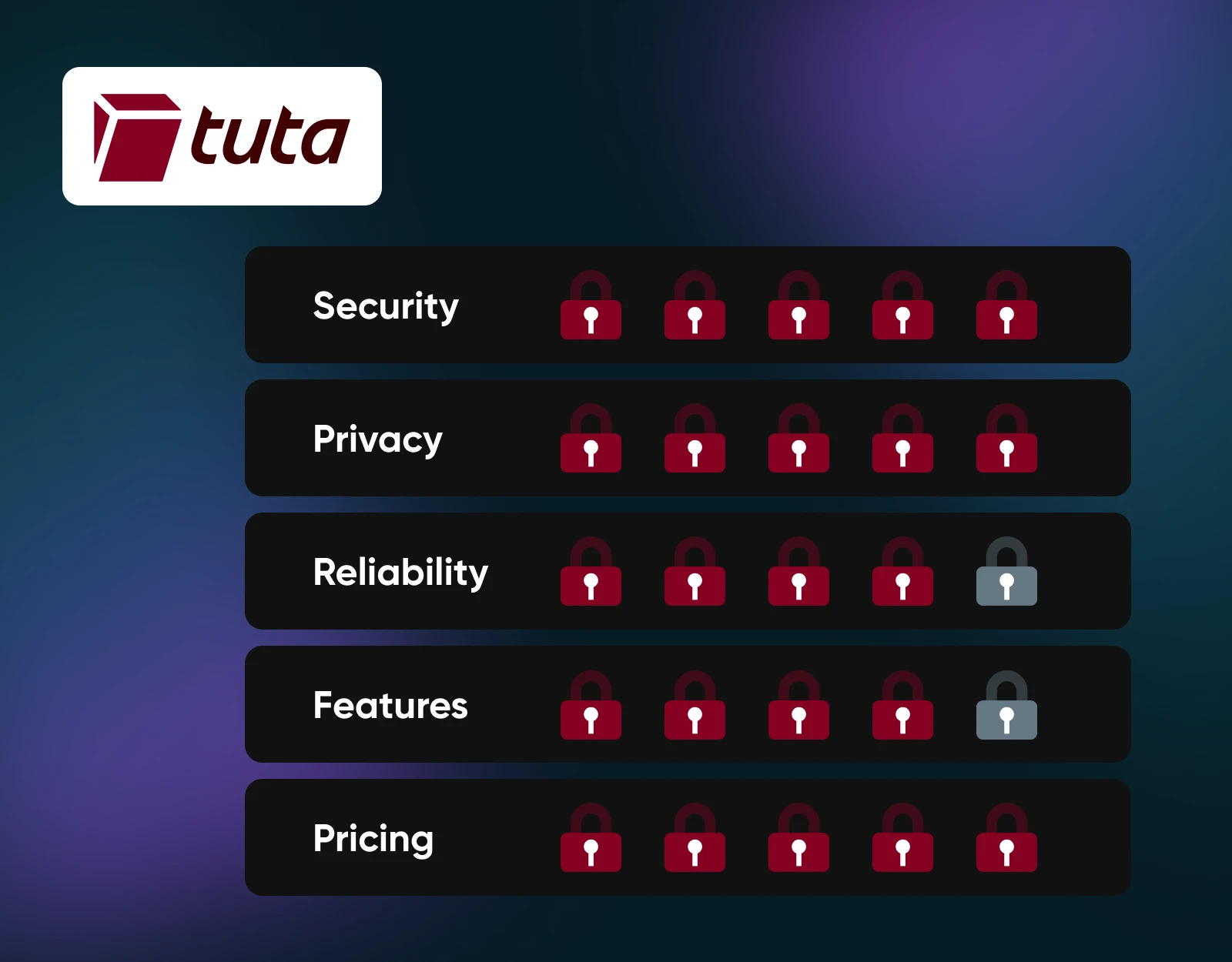
- Security: Excellent. Strong end-to-end encryption keeps your messages secure, including subject lines (unlike ProtonMail). The official apps are open source, so you can literally check the code yourself.
- Privacy: Excellent. Tuta is based in Germany, a country with strong privacy laws. The company also has no access to accounts, even for support.
- Reliability: Good. With 99.95% uptime guaranteed and an excellent track record, Tuta Mail is a trustworthy platform. It only loses marks for cross-device syncing, which is patchy for some users.
- Features: Good. The package includes mail, contact, and calendar, and business plans include 50GB of storage. The main downside is that you’re forced to use Tuta’s official apps, so there’s major lock-in.
- Pricing: Excellent. Free to start. Individual accounts start at just €3/month (~$3.51) and business plans from €6/month (~$7.01).
The expert verdict: Tuta provides impressive protection, with features that cater to solopreneurs and small businesses. Just be aware that you have to use the official apps.
3. Mailfence: Better Security in Your Current Workflow
Mailfence strikes a nice balance between security and usability. This Belgium-based platform offers encrypted email that syncs with regular email clients via POP, IMAP, SMTP, and Exchange ActiveSync.
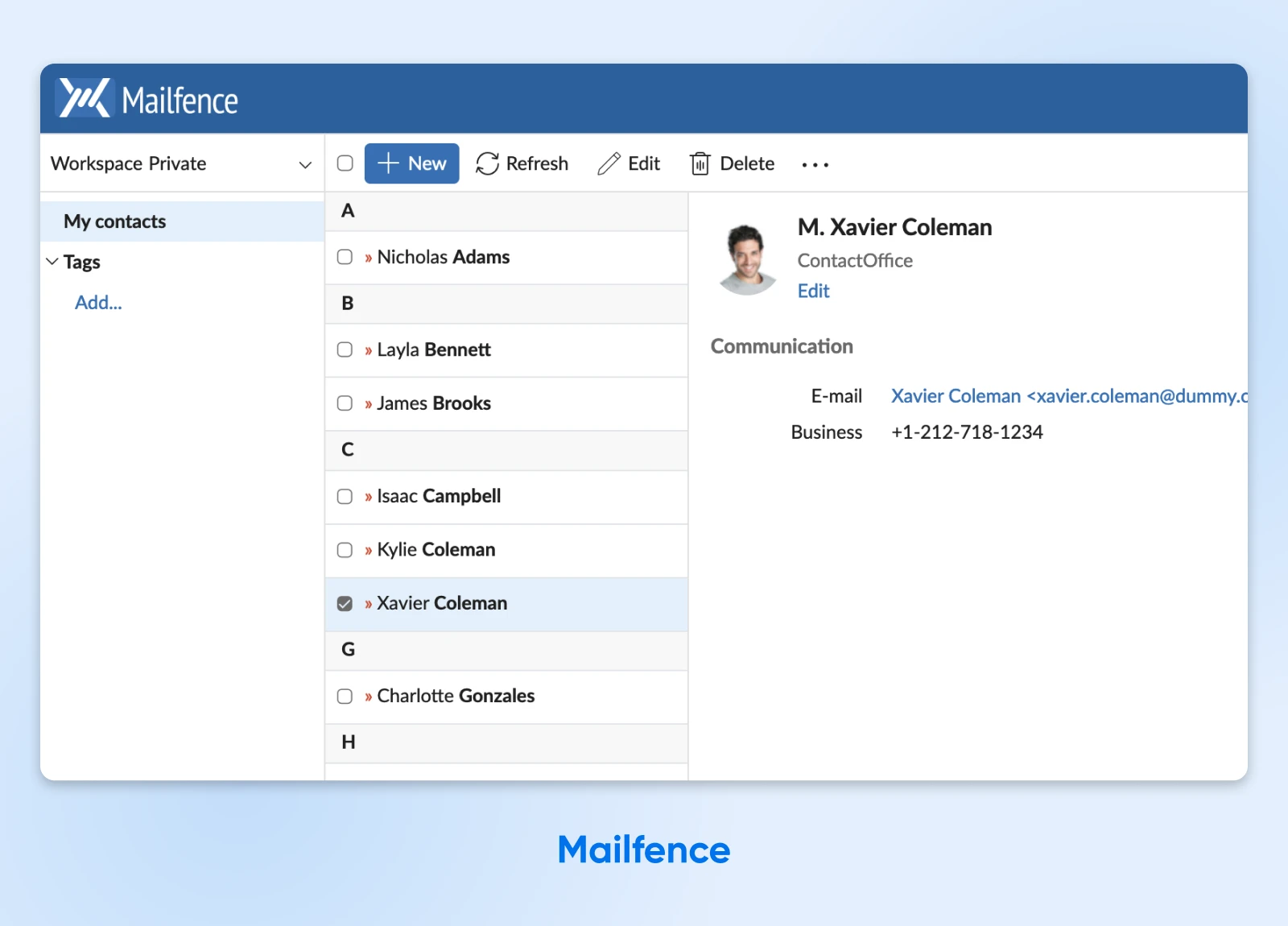
The downside here is that email addresses and subject lines aren’t encrypted. But that’s the price you pay for compatibility.
Mailfence also lacks native apps, but you can access your inbox (along with calendars, documents, and contacts) via a nice web app.
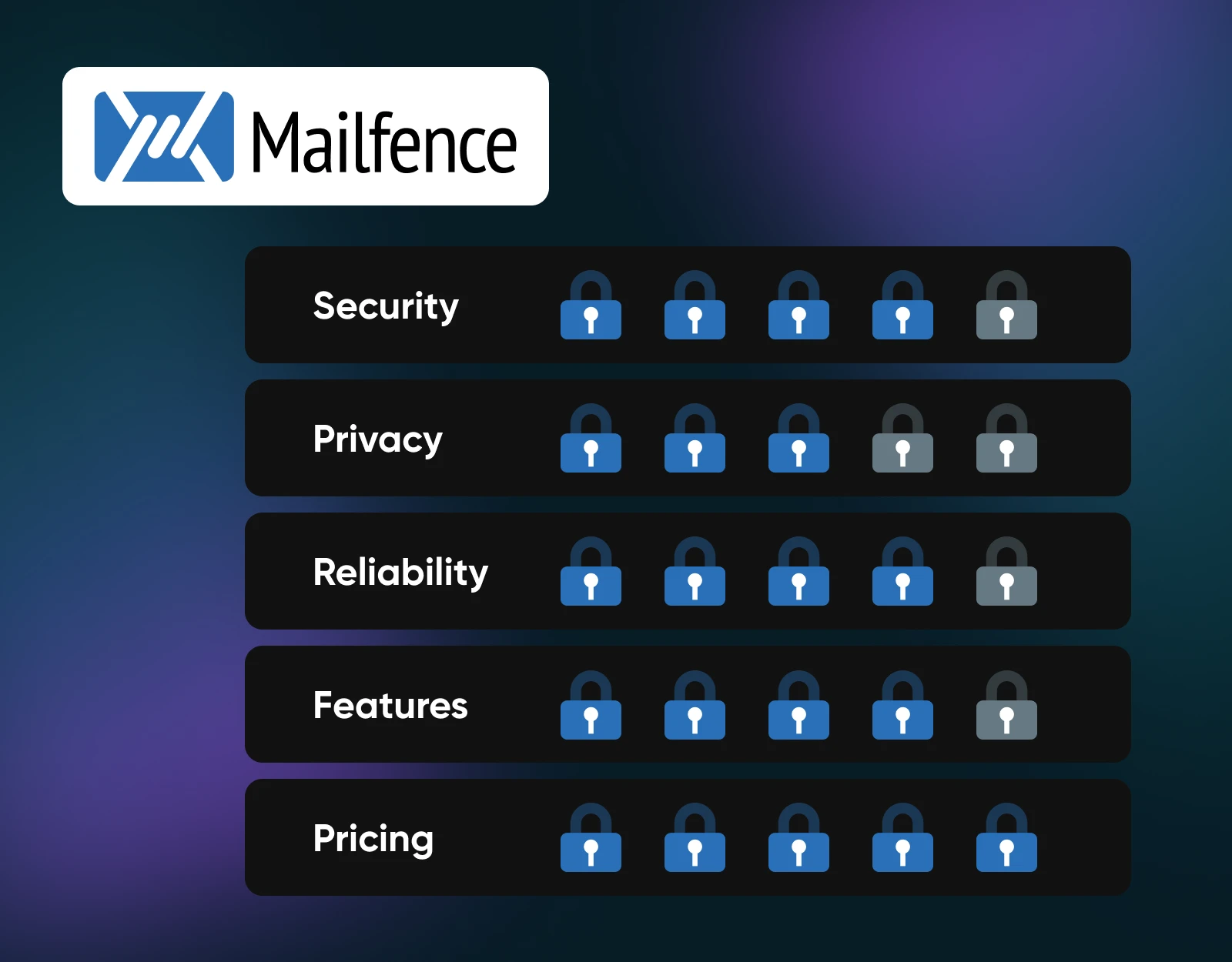
- Security: Good. Mailfence uses OpenPGP encryption, which keeps the contents of your messages secure. You can also set up digital signatures (like signing for a delivery) for added security.
- Privacy: Fair. While Belgian law can’t match the privacy protections of Switzerland, EU privacy regulations (including GDPR) are still in play. Mailfence has transparent polices, but the company does keep some logs.
- Reliability: Good. Mailfence has a solid track record for uptime and stability. The fact this platform relies on well-established email protocols means technical troubles are less likely.
- Features: Good. You get everything you would expect from an email suite, including calendar, contacts, and file storage. Custom domains work well. Standard protocols mean better business tool integration.
- Pricing: Excellent. Business plans start at €3.50/month (~$4.08), with generous storage and the whole suite of tools.
The expert verdict: If you’re looking for a more secure alternative to the Google or Microsoft 365 suites, Mailfence is an excellent choice. It’s powerful, flexible, and affordable — just don’t expect world-class protection.
4. StartMail: King of Aliases
One way to protect your email account is by never giving out your actual address. With StartMail, that’s completely possible.
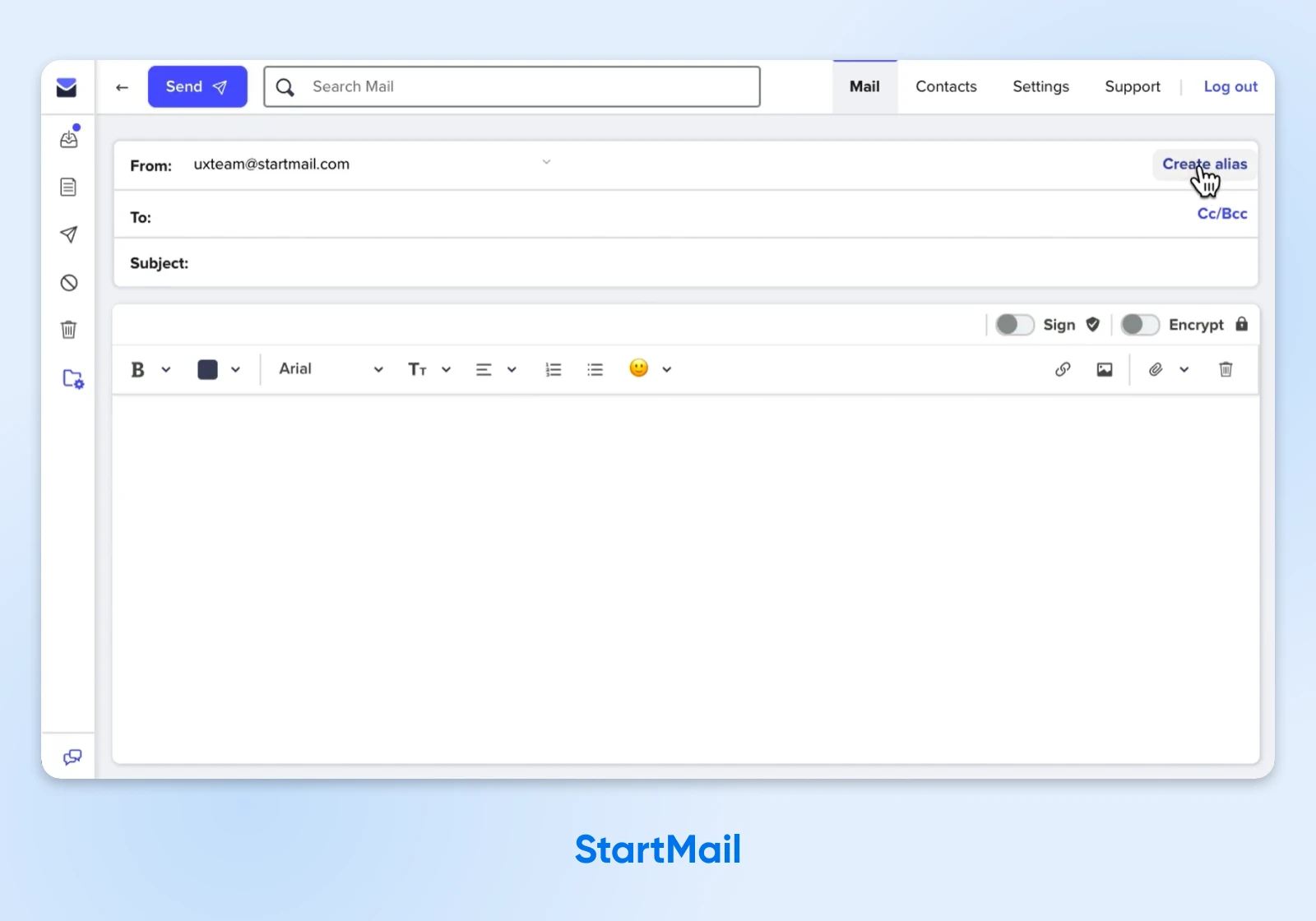
This Dutch provider offers unlimited email aliases, allowing you to sign up for a myriad of services without attracting unwanted attention.
StartMail also offers password-based encryption. As you draft an email, you create a secret key that unlocks the message. Makes you feel very James Bond.
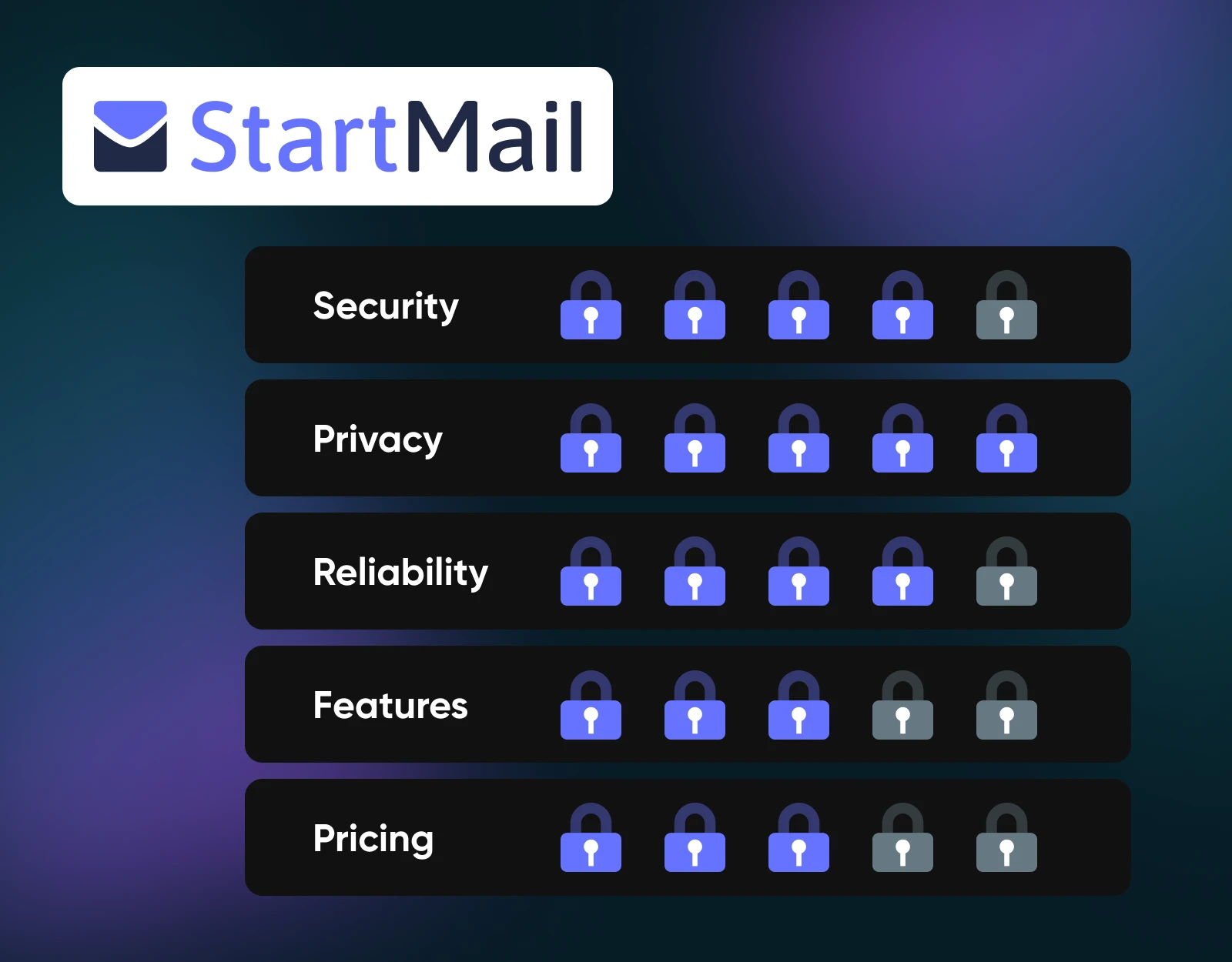
- Security: Good. Solid end-to-end encryption, password protection on messages, and unlimited aliases. That said, subject lines and email addresses are not encrypted.
- Privacy: Excellent. Dutch law is decent for data protection, and it’s supplemented by EU data frameworks. StartMail is also operated by an established privacy company with a good track record.
- Reliability: Good. Stable service with IMAP/SMTP support. However, the alias system occasionally triggers spam filters on recipient servers, meaning legitimate emails are sometimes blocked.
- Features: Fair. Unlimited aliases are the standout. But there’s no calendar or file storage.
- Pricing: Fair. Plans start at $4.99/month, which is fine — but you can get more bang for your buck elsewhere.
The expert verdict: If you want aliases to keep your operations separated, StartMail is a good choice. Otherwise, there are better options in this list.
5. Mailbox.org: Secure Productivity on a Shoestring
Mailbox.org is more than an email provider. This German-made platform attempts to replace your entire office suite, including email, document editing, video conferencing, cloud storage, and more.
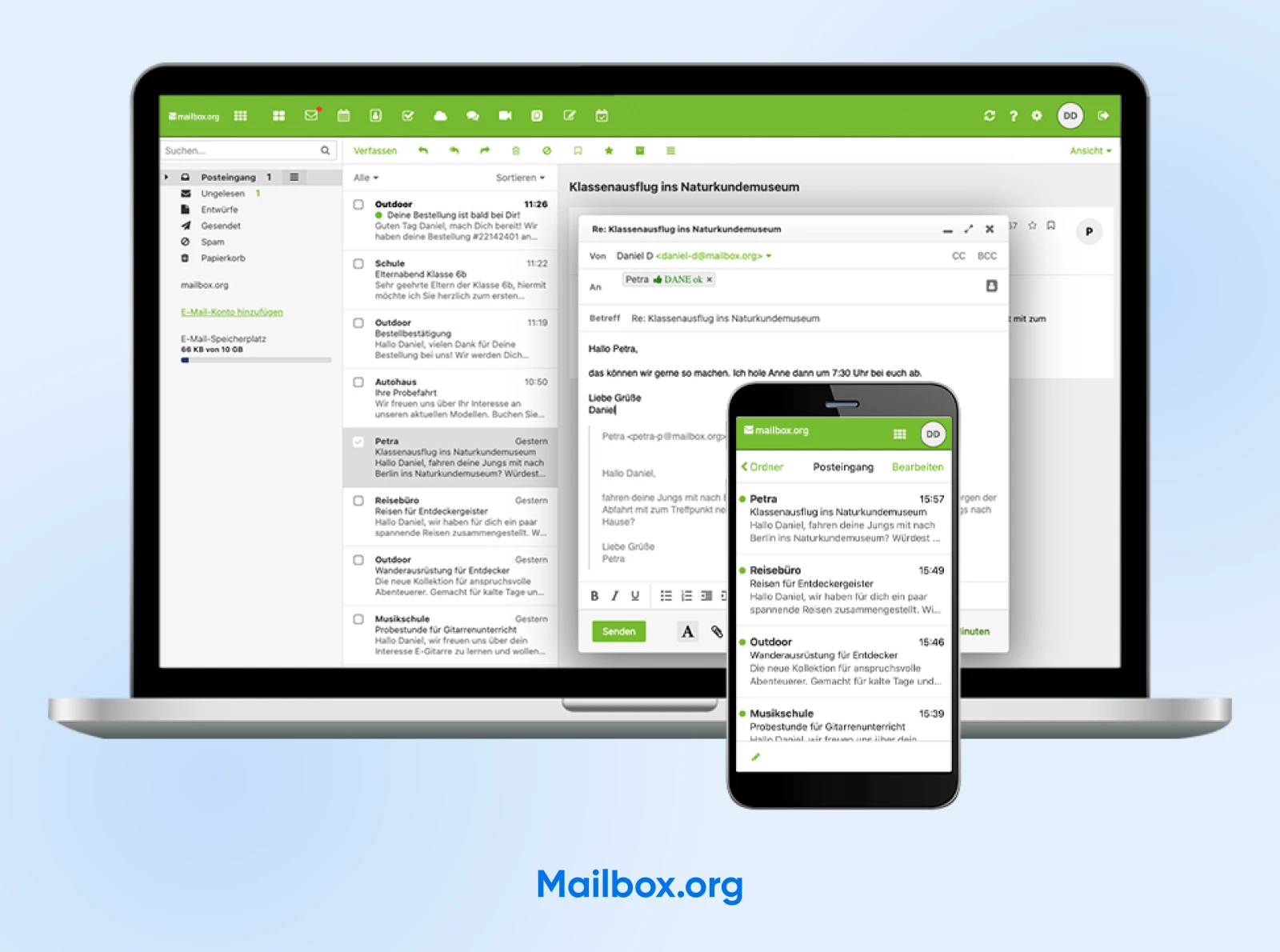
All of these features are well protected. The platform supports Pretty Good Privacy (PGP) encryption, and your data is encrypted for storage, as well. We’re pretty impressed by their underlying infrastructure.
Personal plans are very inexpensive, but expect to cough up for a business account.

- Security: Excellent. Mailbox.org uses strong encryption standards and is hosted in Germany under strict data protection laws. You can encrypt your cloud storage, too.
- Privacy: Excellent. As a German company, Mailbox.org is subject to GDPR. They have a transparent privacy policy, do not log IP addresses, and actively advocate for data privacy.
- Reliability: Excellent. The service has been operating since 2014 and has a strong reputation for uptime and stability. We also like that Mailbox.org has full ownership over their infrastructure.
- Features: Good. The mail features are strong, and you get access to a full suite of tools. That said, many of those tools feel a bit lackluster if you’re used to Microsoft 365 or Google Workspace.
- Pricing: Fair. The most basic package is only €1/month (~$1.17), and you can get a custom domain on the €3/month plan (~$3.51). However, dedicated business plans cost €26/month (~$30.42).
The expert verdict: Mailbox.org is a genuinely impressive secure email solution. Just don’t set your expectations too high for the office tools.
6. Zoho Mail: Surprisingly Secure Office Suite
You might not have expected to see Zoho on this list. After all, it’s a mainstream player in productivity, with over 16 million users.
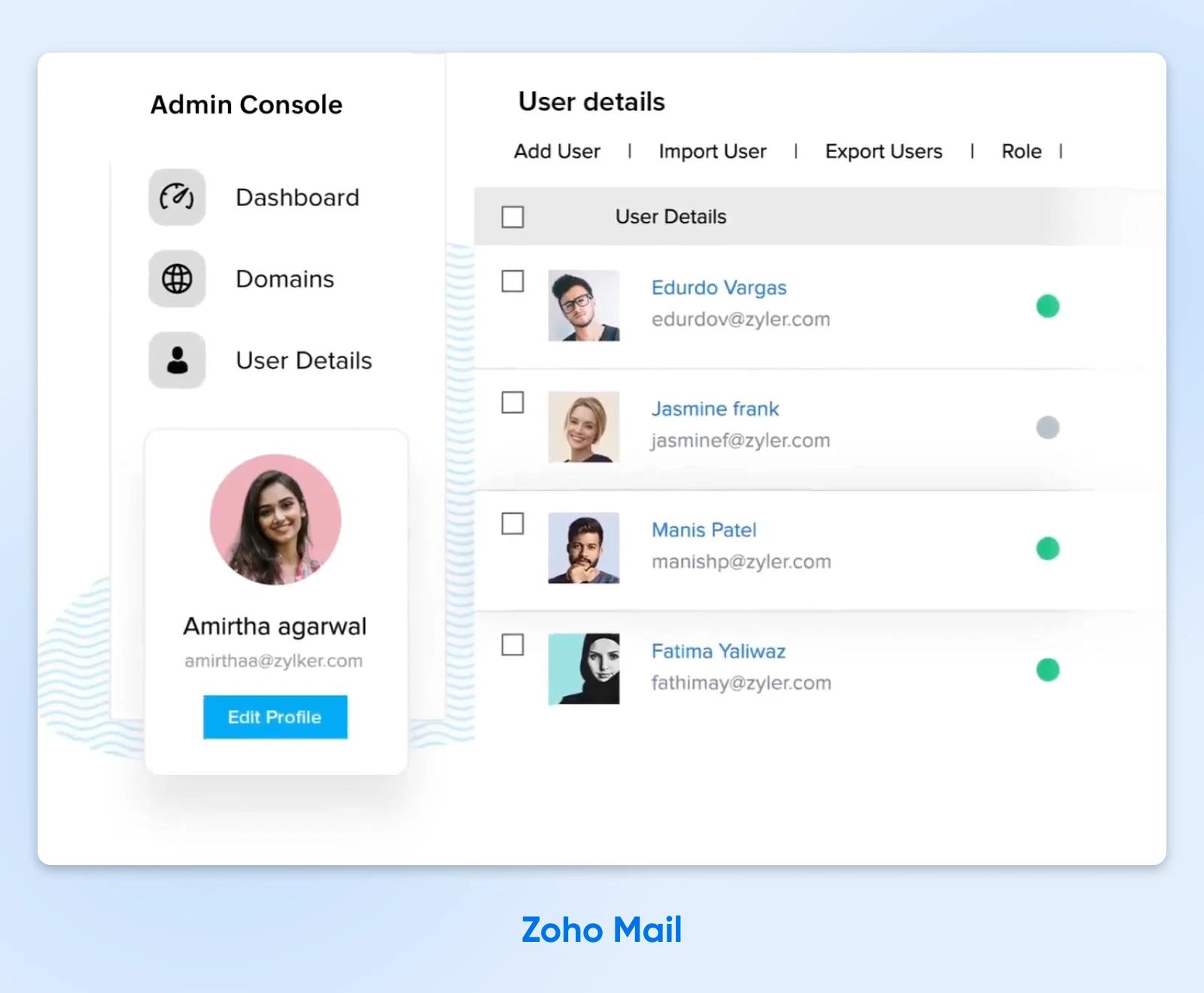
But actually, the platform’s email product is very secure.
While you don’t get full end-to-end encryption, Zoho Mail uses strong encryption for message transfer and storage. You get powerful anti-spam and virus filtering, as well.
The main downside? Zoho is based in India — a jurisdiction that doesn’t have a great record for privacy.
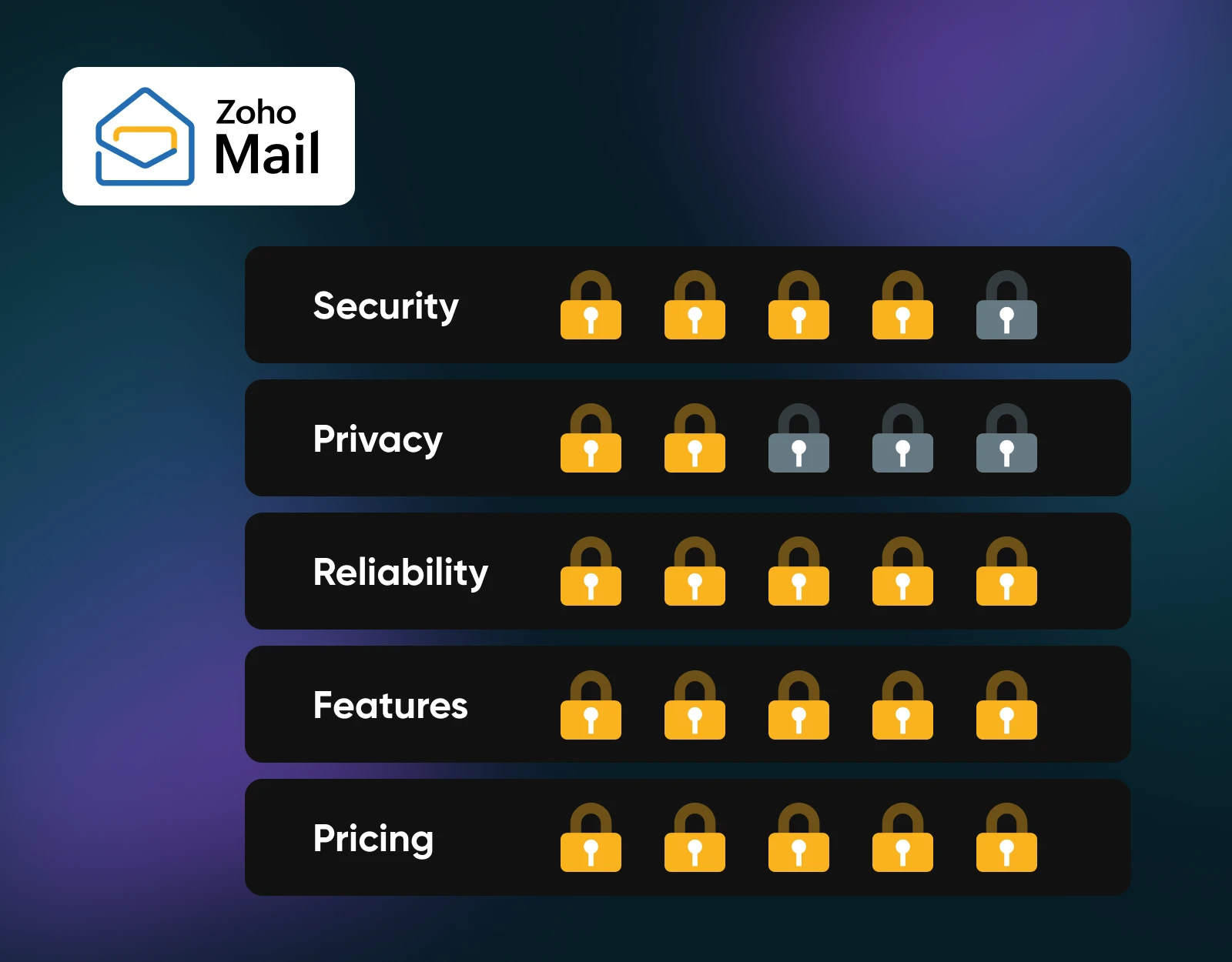
- Security: Good. Industry-standard encryption in transit and at rest, two-factor authentication, and S/MIME support. Not end-to-end encrypted, but includes advanced threat protection. Good enough for most businesses.
- Privacy: Adequate. While Zoho has a decent privacy policy and doesn’t scan emails (looking at you, Gmail), being India-based raises some concerns about government access.
- Reliability: Excellent. Zoho is a massive global company with millions of users and a long track record (founded in 1996). Their infrastructure is designed for enterprise-level reliability, with 99.9% uptime guaranteed.
- Features: Excellent. A modern interface, support for custom domains, and a powerful admin dashboard for handling multiple company accounts. Plus, great mobile apps and integration with loads of Zoho apps.
- Pricing: Excellent. Starts at $1/month. Even the top professional plan with 100GB of storage per user is just $6/month.
The expert verdict: While Zoho Mail isn’t the most secure solution here, it’s still pretty robust. It also offers great features. You just have to decide whether to entrust your data to Indian privacy laws.
7. Posteo: Pure Privacy for Individuals
Posteo takes privacy to extremes.
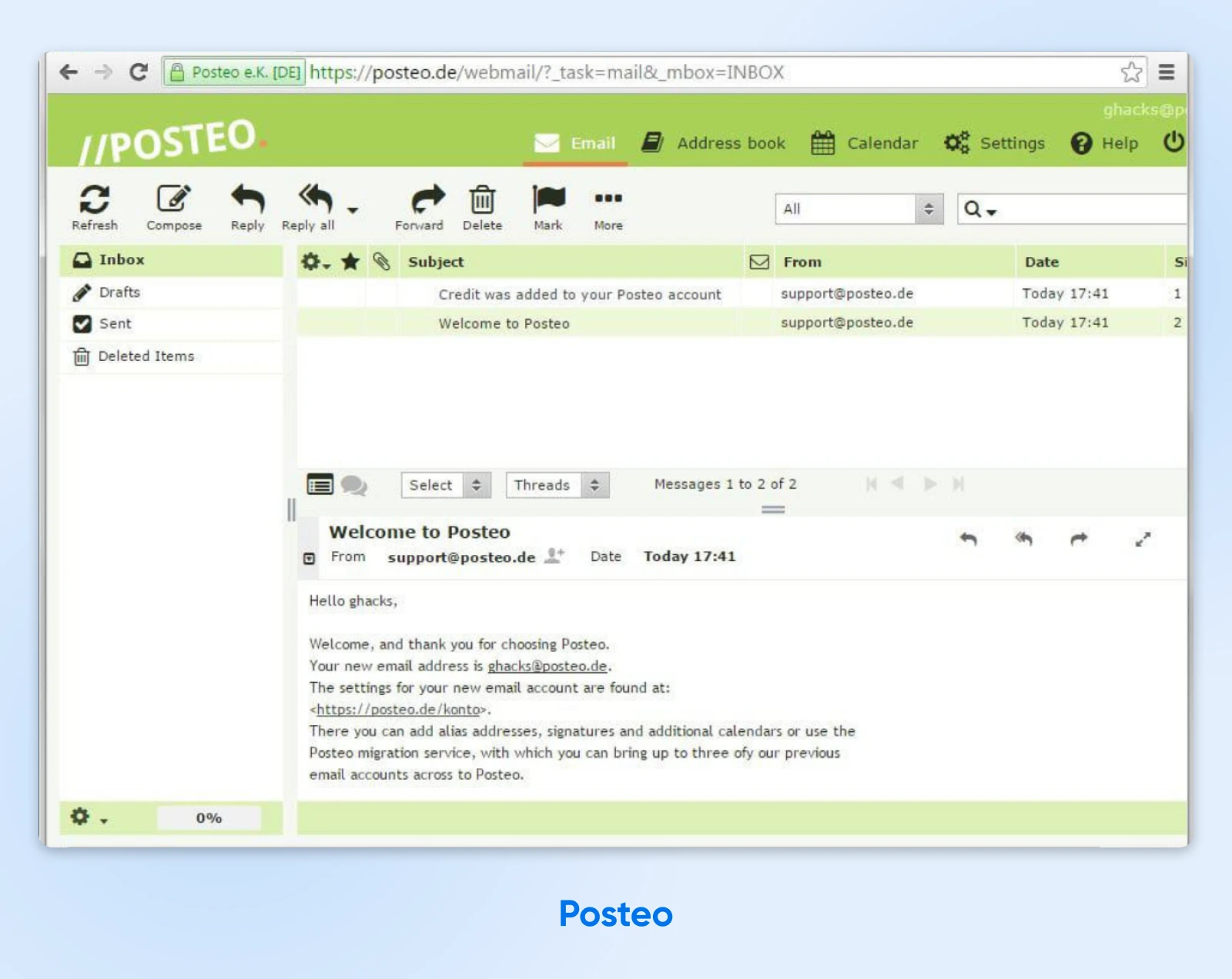
You don’t have to reveal any identifying information to sign up with this German provider. There’s no tracking, no logging. They even accept payment by mail.
Switching to Posteo is easy, as well. The platform offers a free migration service for up to three email accounts, and your data is guaranteed.
So… why isn’t Posteo number one? There’s one big caveat for business users: you can’t use your own domain. The only option is a @posteo.de address.
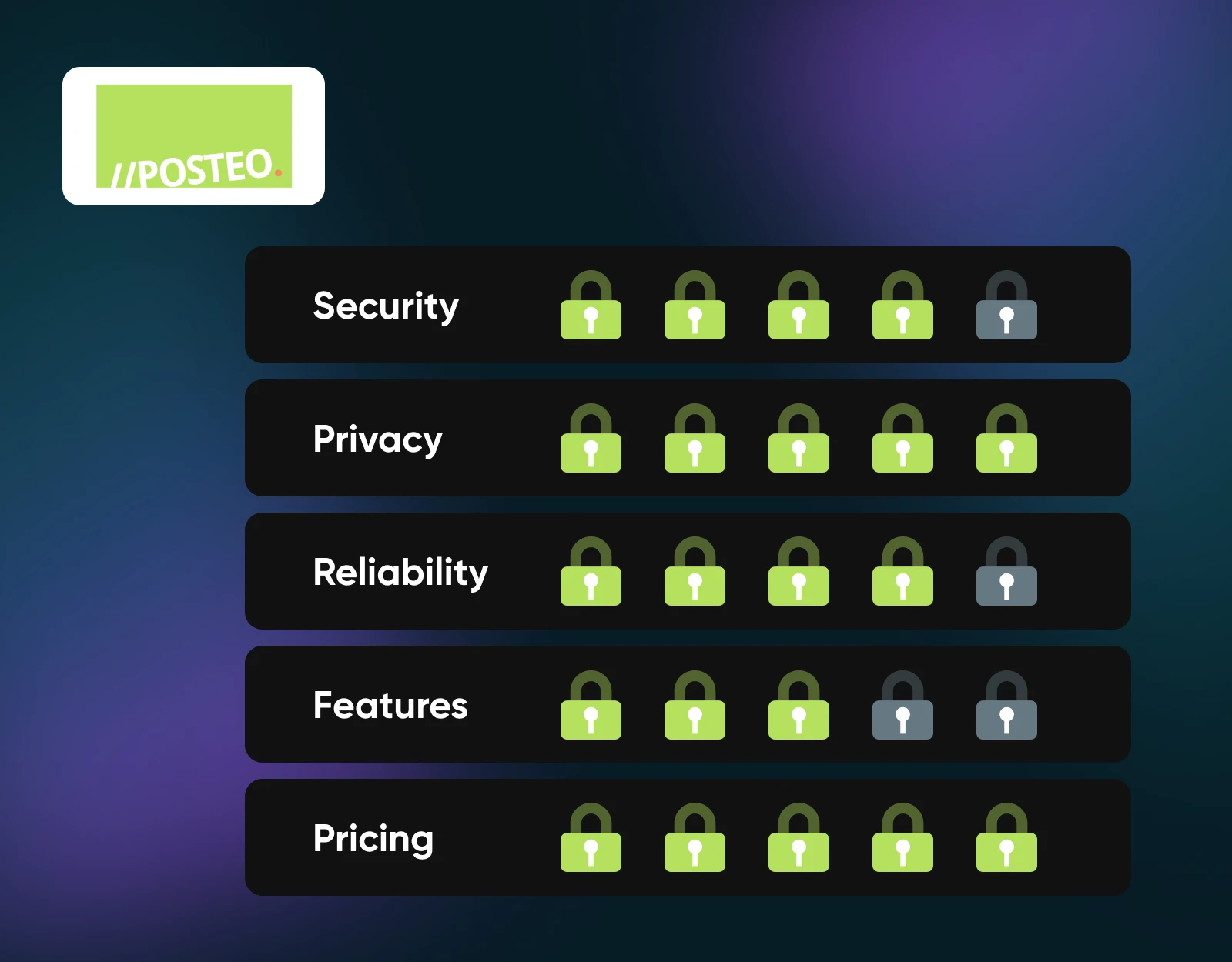
- Security: Good. Posteo offers full-disk encryption, and the platform strips away metadata. It doesn’t provide end-to-end encryption by default, though.
- Privacy: Excellent. You don’t need to reveal any personal information to sign up, and Posteo doesn’t store IP addresses. Being based in Germany, the service also benefits from local privacy laws.
- Reliability: Good. Posteo has a solid reputation for uptime, and the business runs a sustainable model. A few users report slight delays in sending emails, possibly as a result of PGP encryption.
- Features: Fair. No custom domains is the headline problem, and you only start with 2GB of storage. That said, the web app works well and includes both contacts and a calendar feature.
- Pricing: Excellent. While Posteo doesn’t offer a free plan, you can get started from €1/month (~$1.17) and add storage, aliases, and calendars on a pay-as-you-go basis.
The expert verdict: If you’re looking for a personal email service, Posteo offers true privacy. The inability to use your own domain name is a dealbreaker for most businesses, though.
Providers That Missed the Cut
The seven services above aren’t the only secure email platforms you might encounter. Some other notable names that didn’t make our list include:
- Runbox: A veteran platform that has built up trust over 25 years. However, the web app is quite slow, and support is limited to email and support forums.
- Hushmail: This platform isn’t as secure as it would seem at first, as the app can read your encryption keys. That means your messages could be hacked.
- Soverin: Although Soverin stores data in Germany, the company maintains access to your data.
- CounterMail: On paper, this service offers impressive security measures. Unfortunately, the interface is straight out of 1995.
Which Secure Email Platform Is Right for You?
Secure email comes in many shapes and sizes. While some platforms are generally stronger than others, you should pick your provider based on your specific needs.
Here’s a quick cheat sheet:
- For maximum security → Tuta Mail, Mailbox.org
- For a secure office suite → Proton Mail, Zoho Mail, Mailbox.org
- For compatibility with email clients → Mailfence, Mailbox.org, Posteo, Zoho Mail
- For total privacy → Posteo
- For email aliases → StartMail
Diving Deeper: How Does Secure Email Work?
To make a more informed decision, it’s worth learning how secure email services actually work.
Sending an email without encryption is like mailing a postcard.
In theory, only the recipient should see your thoughts from Bora Bora. But someone could take a quick snoop at any time your postcard is in transit.
When you send an email via a secure email platform, your message is encrypted. That is, it’s written in a code that can only be deciphered by someone with the right key.
At least, in theory.
There are two main types of encryption used by email providers:
- Transport encryption (TLS) protects your email while it travels between servers, like an armored truck carrying mail. But in theory, the postal workers at each stop could still open and read it.
- End-to-end encryption (E2EE) is much stronger. It encodes your message and stores it in a safe, preventing your provider from reading it.
Be aware that even if you’re using a fully secure system, the person who receives your email might not be. And that means that the contents of your messages could be stored on unencrypted servers.
Are Gmail, Outlook, and Yahoo Secure?
You might think that encryption would be standardized by now.
The reality is quite different:
- Gmail uses TLS by default. You need an enterprise Google Workspace account to access end-to-end encryption.
- Outlook offers TLS. It doesn’t offer E2EE.
- Yahoo uses TLS. There’s no support for E2EE.
Does that matter? It depends.
Many inboxes are used for sending outreach emails or marketing updates. For these purposes, a TLS-secured service should be just fine. (If you’re looking for something affordable, try DreamHost Email).
However, if your business email handles sensitive information, it’s worth opting for a service with better security.
Buying Tips from the Hosting Experts
Here’s a trade secret: not all providers are worth your hard-earned cash. Some just talk a good game.
Here are some insider tips from our team of hosting experts:
- “Zero knowledge” isn’t always zero. Many providers still have access points during key exchange, backup processes, or account recovery. Always check the privacy policy fine print to be sure.
- Server location is only half the story. While it’s better if your provider uses servers in a country with good data protection, be aware that your messages might pass through more than one region.
- Backups and recovery really matter. Try to choose a provider that offers fully encrypted backups. Some export in plain text (yikes).
- Free email usually has a hidden cost. If you’re not paying anything, there’s a good chance your data is being harvested for advertising purposes. The only exception is very limited plans.
- Smaller providers are generally higher risk. A service that has been popular for years is much less likely to slip away with your data than a tiny startup.
Here’s how the top secure email providers compare across five key categories:
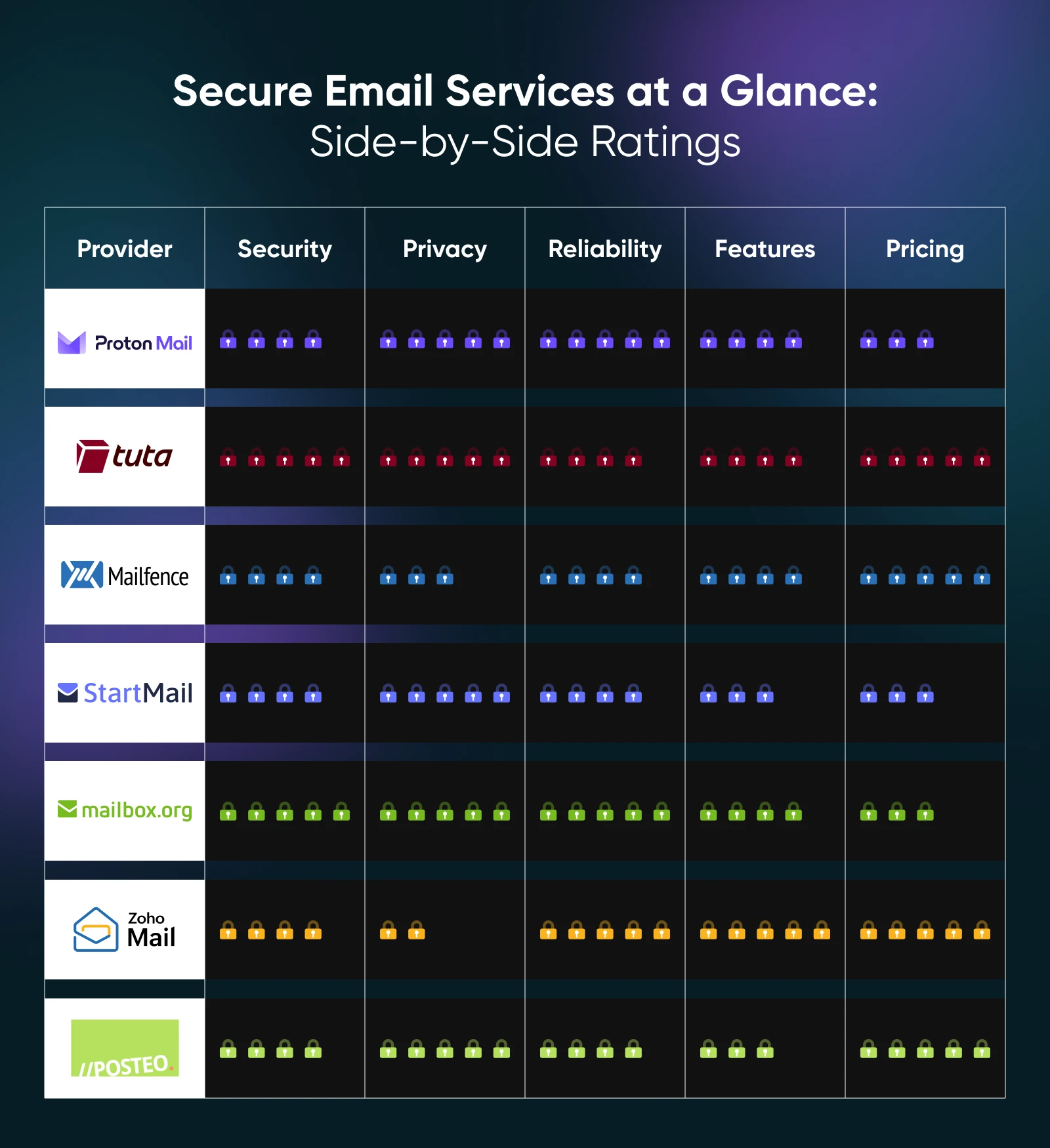
Lock Down Your Business Email
The thought of someone — anyone — reading through your emails is nightmare fuel. And the stakes are even higher when your customer data is on the line.
Secure email services can provide some peace of mind. But before you upgrade, take your time to do some research. Always look for:
- End-to-end encryption or strong encryption for transit and rest
- Two-factor authentication
- Minimal logging and data storage
- Guaranteed uptime
Looking for better security on your website as well? At DreamHost, all our hosting plans come with free SSL/TLS certificates, two-factor authentication, and automatic backups. Plus, you can add email!

DreamShield
Protect Your Website with DreamShield
Our premium security add-on scans your site weekly to ensure it is free of malicious code.
Enable DreamShield


